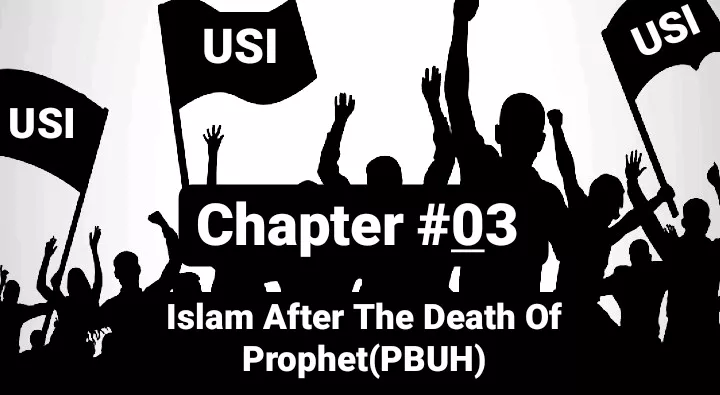USI Chapter #03
Chapter 3
Islam after the Death of Prophet (Peace Be upon Him)
Section a
Disunity of Islam.
Section b
Occurrences of Differences. Section – a
DISUNITY OF ISLAM
As no system or advice for the system of government was left by the Prophet (Peace Be upon Him), the Muslims got stunned on hearing the news of the death of the Prophet (Peace Be upon Him). The second caliph Hazrat Umar (May Allah Be Pleased with Him) went to the extreme, that he declared, if any body talked about the death of the Prophet (Peace Be upon Him), he would be met with his (Umber’s) sword. It was Hazrat Abu Bakr (May Allah Be Pleased with Him), the first caliph, who calmed the audience and Hazrat Umar (May Allah Be Pleased with Him), by first quoting the Quranic verse, in which Muslims were asked, if Muhammad (Peace Be upon Him) was killed or dies naturally, would the Muslims abandon the faith on unity of God??? After quoting this verse Hazrat Abu Bakr (May Allah Be Pleased with Him) said that Muhammad (Peace Be upon Him) was a human being and he had died. Muhammad (Peace Be upon Him) worshipped God and God is alive. All those who believe on God should remain steadfast on their faith, as God is still alive even though Muhammad (Peace Be upon Him) had died. Hazrat Umar (May Allah Be Pleased with Him) later on said that it was due to recitation of the above quoted verse by Hazrat Abu Bakr (May Allah Be Pleased with Him) that the curtains of passions were withdrawn from his mind, even though this verse was many times recited by Hazrat Umar (May Allah Be Pleased with Him) and all other Muslims before. As already said, that there was no advice available with Muslims from the Prophet (Peace Be upon Him) nor Quran had given any set system of government for the Muslims, therefore, after the demise of the Prophet (Peace Be upon Him) of Islam, the Muslim community had to evolve themselves a system of government, getting the light form Quran and life of the Prophet (Peace Be upon Him). The Muslims of Ansaar community, who had given a lot of sacrifice for unity and prosperity of Islam, assembled in the mosque of Banu Thaqiffa and tried to get Baith for Ansaar leader, Hazrat Saad bin Abada (May Allah Be Pleased with Him), who was sick and was brought in a cot to the mosque. Hazrat Umar (May Allah Be Pleased with Him) after hearing this news from Hazrat Abu Obaida (May Allah Be Pleased with Him) counseled with Hazrat Abu Bakr (May Allah Be Pleased with Him) and they rushed to the said...
Islam after the Death of Prophet (Peace Be upon Him)
Section a
Disunity of Islam.
Section b
Occurrences of Differences. Section – a
DISUNITY OF ISLAM
As no system or advice for the system of government was left by the Prophet (Peace Be upon Him), the Muslims got stunned on hearing the news of the death of the Prophet (Peace Be upon Him). The second caliph Hazrat Umar (May Allah Be Pleased with Him) went to the extreme, that he declared, if any body talked about the death of the Prophet (Peace Be upon Him), he would be met with his (Umber’s) sword. It was Hazrat Abu Bakr (May Allah Be Pleased with Him), the first caliph, who calmed the audience and Hazrat Umar (May Allah Be Pleased with Him), by first quoting the Quranic verse, in which Muslims were asked, if Muhammad (Peace Be upon Him) was killed or dies naturally, would the Muslims abandon the faith on unity of God??? After quoting this verse Hazrat Abu Bakr (May Allah Be Pleased with Him) said that Muhammad (Peace Be upon Him) was a human being and he had died. Muhammad (Peace Be upon Him) worshipped God and God is alive. All those who believe on God should remain steadfast on their faith, as God is still alive even though Muhammad (Peace Be upon Him) had died. Hazrat Umar (May Allah Be Pleased with Him) later on said that it was due to recitation of the above quoted verse by Hazrat Abu Bakr (May Allah Be Pleased with Him) that the curtains of passions were withdrawn from his mind, even though this verse was many times recited by Hazrat Umar (May Allah Be Pleased with Him) and all other Muslims before. As already said, that there was no advice available with Muslims from the Prophet (Peace Be upon Him) nor Quran had given any set system of government for the Muslims, therefore, after the demise of the Prophet (Peace Be upon Him) of Islam, the Muslim community had to evolve themselves a system of government, getting the light form Quran and life of the Prophet (Peace Be upon Him). The Muslims of Ansaar community, who had given a lot of sacrifice for unity and prosperity of Islam, assembled in the mosque of Banu Thaqiffa and tried to get Baith for Ansaar leader, Hazrat Saad bin Abada (May Allah Be Pleased with Him), who was sick and was brought in a cot to the mosque. Hazrat Umar (May Allah Be Pleased with Him) after hearing this news from Hazrat Abu Obaida (May Allah Be Pleased with Him) counseled with Hazrat Abu Bakr (May Allah Be Pleased with Him) and they rushed to the said...




